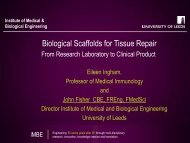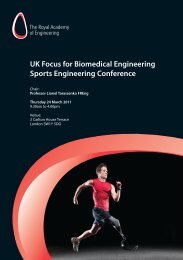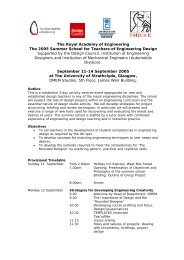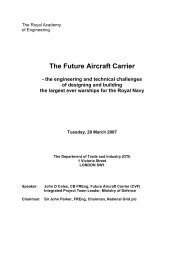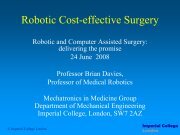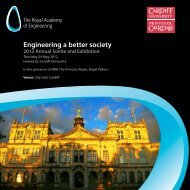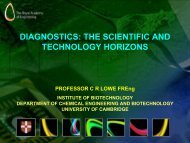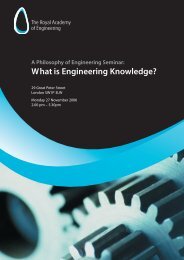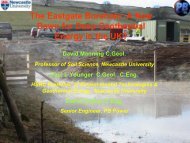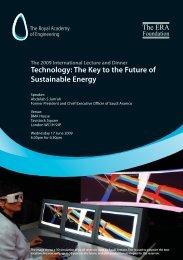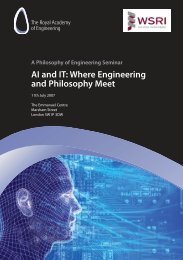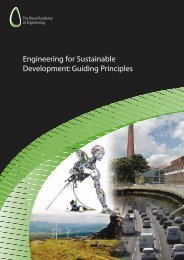RAE Annual review - Cover - Royal Academy of Engineering
RAE Annual review - Cover - Royal Academy of Engineering
RAE Annual review - Cover - Royal Academy of Engineering
Create successful ePaper yourself
Turn your PDF publications into a flip-book with our unique Google optimized e-Paper software.
British cyclists test the new Velodrome in<br />
November 2011. The construction <strong>of</strong> Olympic<br />
stadiums was described by Sir John Armitt in his<br />
Lloyd’s Register Educational Trust lecture<br />
Queen Elizabeth Prize for<br />
<strong>Engineering</strong><br />
The Queen Elizabeth Prize for<br />
<strong>Engineering</strong> was launched in November<br />
2011 at a high-pr<strong>of</strong>ile reception<br />
attended by the leaders <strong>of</strong> all three<br />
political parties. The Prime Minister, the<br />
Deputy Prime Minister and the Leader<br />
<strong>of</strong> the Opposition all spoke at the event<br />
in support <strong>of</strong> the prize and its critical<br />
importance in promoting engineering<br />
in the UK and internationally.<br />
The launch <strong>of</strong> the prize was widely<br />
covered across UK print and broadcast<br />
media, along with a number <strong>of</strong> overseas<br />
media mentions.<br />
The Queen Elizabeth Prize for<br />
<strong>Engineering</strong> is an international biennial<br />
£1 million prize for an individual (or a<br />
team <strong>of</strong> up to three people) responsible<br />
for a groundbreaking innovation in<br />
engineering that has been <strong>of</strong> global<br />
benefit to humanity. The prize will<br />
in their fields. This year’s winner was<br />
Dr Simon Cotton, an <strong>RAE</strong>ng/EPSRC<br />
Research Fellow at Queen’s University<br />
Belfast, for his work on pioneering<br />
networks to carry mobile phone signals<br />
between human bodies.<br />
also provide a high-pr<strong>of</strong>ile, global<br />
communications platform to advance<br />
and promote engineering in the UK<br />
and around the world, with a particular<br />
focus on engaging the public and<br />
inspiring young people to pursue a<br />
career in engineering.<br />
The <strong>Academy</strong> also celebrates established<br />
engineers for their valuable contributions<br />
to engineering and society. This year, Dr<br />
Andrew Viterbi, mobile communications<br />
pioneer, inventor <strong>of</strong> the Viterbi Algorithm<br />
which unscrambles encoded data, and<br />
co-founder <strong>of</strong> Qualcomm, received the<br />
International Medal.<br />
Learning from industry experts was a<br />
key theme in the events programme<br />
that provided a platform for engineers<br />
to share their work with the wider<br />
world. In the Hinton lecture, BP Chief<br />
Executive Bob Dudley discussed the<br />
history <strong>of</strong> oil exploration and the<br />
company’s role in innovatory <strong>of</strong>fshore<br />
drilling. The Lloyd’s Register Educational<br />
Trust lecture was given by Chairman<br />
<strong>of</strong> the Olympic Delivery Authority, Sir<br />
John Armitt CBE FREng, who revealed<br />
the challenges behind the UK’s most<br />
high-pr<strong>of</strong>ile construction project. From<br />
decontamination and sustainability to<br />
The judging panel is chaired by Lord<br />
Alec Broers FREng FRS and comprises<br />
leading figures from the international<br />
engineering community. The first prize<br />
will be presented by HM The Queen in<br />
spring 2013.<br />
Robotic space exploration<br />
In March 2012, Dr Charles Elachi, Director <strong>of</strong> NASA’s Jet<br />
Propulsion Laboratory, gave a personal insight into the<br />
challenges <strong>of</strong> landing the Curiosity Mars Science Laboratory<br />
infrastructure requirements and legacy,<br />
he outlined the issues behind the<br />
successful creation <strong>of</strong> the London 2012<br />
Olympic park.<br />
The regional lecture was given by<br />
Pr<strong>of</strong>essor Anne Neville FREng FRSE,<br />
Pr<strong>of</strong>essor <strong>of</strong> Tribology and Surface<br />
<strong>Engineering</strong> at the University <strong>of</strong> Leeds.<br />
Pr<strong>of</strong>essor Neville shared insights into<br />
her complex nanoscale research, the<br />
applications <strong>of</strong> which span many areas,<br />
from extending the lifespan <strong>of</strong> hip joints<br />
to managing the corrosion <strong>of</strong> pipelines<br />
carrying oil.<br />
The <strong>Academy</strong> also reaches out to a much<br />
broader audience through its quarterly<br />
magazine Ingenia, which carries articles<br />
that cover the spectrum <strong>of</strong> engineering<br />
and pr<strong>of</strong>iles <strong>of</strong> engineers across all<br />
disciplines. This year it published articles<br />
on the use <strong>of</strong> tissue engineering to treat<br />
osteoarthritis, the introduction <strong>of</strong> facial<br />
recognition systems to airports, nuclear<br />
decommissioning in the UK and the<br />
challenges involved in repainting the<br />
Forth Bridge. The printed version <strong>of</strong> the<br />
magazine has a readership <strong>of</strong> 33,000 with<br />
another 30,000 people accessing the<br />
online version each month.<br />
Engaging across society<br />
With new funding from the Department<br />
for Business, Innovation and Skills,<br />
the <strong>Academy</strong> took up the charge to<br />
lead the engineering pr<strong>of</strong>ession in<br />
encouraging a more diverse group <strong>of</strong><br />
people to choose engineering careers.<br />
The <strong>Academy</strong> programme builds on<br />
its own internal diversity campaign<br />
which has resulted in a pronounced<br />
increase in the diversity <strong>of</strong> new Fellows<br />
elected, and is reflected across all facets<br />
<strong>of</strong> its public-facing work. Pr<strong>of</strong>essor<br />
Dame Wendy Hall FREng FRS leads this<br />
programme on behalf <strong>of</strong> the <strong>Academy</strong>’s<br />
Council. In March 2012, the <strong>Academy</strong><br />
gained external recognition for its work<br />
on gender equality through the UKRC<br />
SET Fair Standard assessment process.<br />
Feedback from the assessment will be<br />
used to drive progress and broaden<br />
the focus on diversity to include other<br />
rover on Mars at the <strong>Academy</strong>’s ERA Foundation International<br />
Lecture entitled <strong>Engineering</strong> and Technological Challenges in<br />
Robotic Space and Earth Exploration.<br />
Accompanied by a dramatic video, he described the landing<br />
process as “six minutes <strong>of</strong> terror” and explained how the<br />
touchdown <strong>of</strong> Curiosity on Mars will be significantly different<br />
from that <strong>of</strong> its predecessors. The landing will involve a<br />
‘sky crane’ carrier that will hover at around 10m above the<br />
surface <strong>of</strong> Mars, before lowering the rover to the ground on<br />
6 August 2012.<br />
Dr Elachi described the task as, “equivalent to me being in<br />
LA and hitting a golf ball to St Andrews here in the UK - and<br />
the ball landing in a cup that is moving at around 60,000mph,<br />
because Mars is moving.”<br />
Dr Elachi said that getting a sample back from Mars is one <strong>of</strong><br />
NASA’s key goals and the highest priority <strong>of</strong> the decade.<br />
groups including people from minority<br />
ethnic groups, people with disabilities,<br />
and people from disadvantaged<br />
socio-economic backgrounds.<br />
Pr<strong>of</strong>essor Anne Neville FREng FRSE delivered the<br />
<strong>Academy</strong>’s regional lecture in March 2012<br />
20<br />
Promote engineering at the heart <strong>of</strong> society 21




